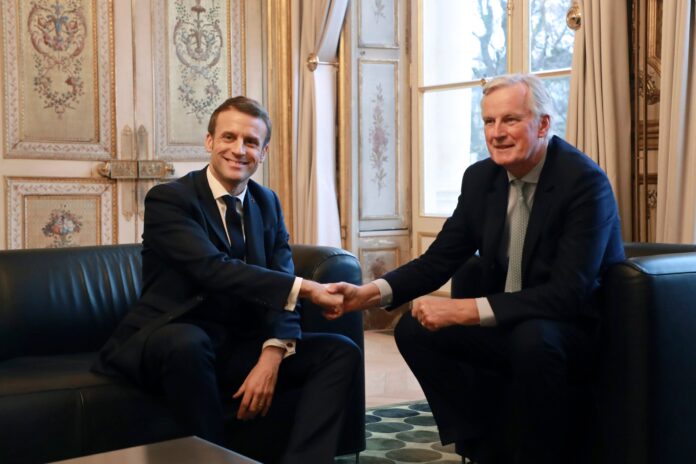French Prime Minister Michel Barnier vowed for unity and a readiness to compromise on Sunday, following the announcement of his new government, which faced immediate threats of a no-confidence motion in parliament. Barnier, who leads a government criticised for leaning too far to the right, assured in a TV interview to swiftly address the nation’s most urgent issues. Under significant pressure to stabilise France’s fragile financial state, he emphasised the need for a “national effort”. He stated that high earners must contribute, but there would be no income tax increases for those with low incomes, wage earners, or the middle-income class.
The new government was revealed on Saturday, 11 weeks after President Emmanuel Macron called a snap election, marking a noticeable shift to the right. Left-wing opponents plan to challenge Barnier’s government with a no-confidence motion next month. Far-right politicians also criticised the new government’s composition. In July’s election, the left-wing alliance New Popular Front secured the most parliamentary seats but fell short of a majority. Marine Le Pen’s National Rally became the largest single party in the National Assembly. Macron argued that the left lacked sufficient support to form a stable government and also rejected a National Rally candidate due to the party’s extremist background. Instead, he appointed conservative veteran Barnier, with support primarily from Macron’s allies, some conservative Republicans, and centrists.
On Sunday evening, Barnier called for “the greatest possible cohesion” and willingness to compromise within the government. However, far-left leader Jean-Luc Melenchon dismissed the new lineup as “a government of the general election losers” and urged its removal “as soon as possible”. On Saturday, thousands protested in Paris and other cities against what they viewed as a denial of July’s election results. Socialist Party chairman Olivier Faure labelled Barnier’s cabinet as the “most right-wing government of the Fifth Republic”. Although Macron hoped for neutrality from the far right, National Rally leader Jordan Bardella claimed the new government had “no future whatsoever”. Macron’s allies retained 12 of the 39 ministry positions, despite conceding some key ministries. Communist Party leader Fabien Roussel remarked, “This is not a new government, it’s a reshuffle.” Former president Francois Hollande, a Socialist, predicted the new government would impose “painful measures on our fellow citizens” and supported a no-confidence motion, which would require an absolute majority in parliament to pass, forcing the government to resign immediately.
Faure indicated the Socialists would propose a no-confidence vote on October 1, following Barnier’s general policy speech to parliament, although he admitted it would likely fail without National Rally support. Le Pen stated they would await the new government’s policy outline before deciding on their stance. Barnier’s first major challenge will be presenting a 2025 budget plan to address France’s severe financial situation. He advocated for “targeted levies on rich people or certain large companies”. France, under formal EU procedure for breaching budgetary rules, must demonstrate serious financial recovery efforts.
The difficult task of submitting the budget plan next month falls to new Finance Minister Antoine Armand, 33, and Budget Minister Laurent de Saint-Martin, who has already indicated that “strong choices” would be necessary. Other notable appointments include Jean-Noel Barrot as Foreign Minister, and Bruno Retailleau, whose appointment as Interior Minister has caused unease even within Macron’s circle, while Defence Minister Sebastien Lecornu, a close Macron ally, retained his position.
What Other Media Are Saying
- The Globalist discusses Emmanuel Macron’s appointment of Michel Barnier as France’s Prime Minister, aiming to stabilize governance despite Marine Le Pen’s influence and left-wing opposition’s concerns.
The article emphasizes Macron’s strategic calculation to prevent the National Rally, led by Marine Le Pen, from gaining power. It highlights the fragmented French parliament and the challenges of forming a government. The appointment of Michel Barnier, known for his ability to work across partisan lines, is seen as a stopgap measure to pass a budget and deal with the EU’s disciplinary procedures. The piece also notes that this arrangement is unlikely to last long and may lead to fresh elections in the future.
The Globalist article underscores Macron’s cool, calculating approach to politics, aiming to mitigate the risk of the National Rally’s rise to power. It critiques the left’s intransigence and inability to form cross-party coalitions, emphasizing the need for pragmatic governance in the face of political extremes. The article concludes by highlighting the broader implications for European stability, given France’s pivotal role in the EU.
Overall, the article provides a nuanced perspective on French politics, emphasizing the complexities and risks involved in Macron’s governance strategy and the potential consequences for both France and Europe. (Read more)
Frequently Asked Questions
Here are some common questions asked about this news
Who is the new French Prime Minister?
What did Barnier promise in his TV interview?
Cohesion and a willingness to compromise.
Will there be income-tax increases for low-income earners?
No, there will be no income-tax increases for low-income earners, wage earners, or the middle-income class.
What is the stance of the National Rally on the new government?
They believe the new government has ‘no future whatsoever.’



